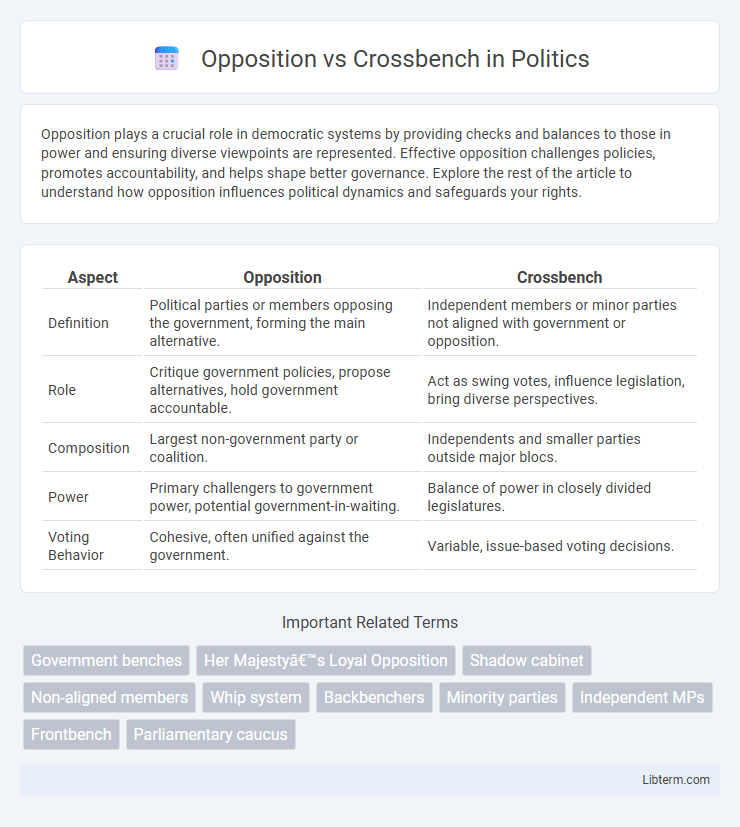Opposition plays a crucial role in democratic systems by providing checks and balances to those in power and ensuring diverse viewpoints are represented. Effective opposition challenges policies, promotes accountability, and helps shape better governance. Explore the rest of the article to understand how opposition influences political dynamics and safeguards your rights.
Table of Comparison
| Aspect | Opposition | Crossbench |
|---|---|---|
| Definition | Political parties or members opposing the government, forming the main alternative. | Independent members or minor parties not aligned with government or opposition. |
| Role | Critique government policies, propose alternatives, hold government accountable. | Act as swing votes, influence legislation, bring diverse perspectives. |
| Composition | Largest non-government party or coalition. | Independents and smaller parties outside major blocs. |
| Power | Primary challengers to government power, potential government-in-waiting. | Balance of power in closely divided legislatures. |
| Voting Behavior | Cohesive, often unified against the government. | Variable, issue-based voting decisions. |
Understanding Opposition and Crossbench: Key Differences
The Opposition consists of political parties that challenge the government and propose alternative policies, often serving as the official government-in-waiting. Crossbench members, typically independent or minor party representatives, do not align with either the government or the Opposition and play a crucial role in balancing power by voting independently. Understanding these distinctions clarifies their unique functions within parliamentary dynamics and legislative decision-making.
Roles and Responsibilities in Parliament
Opposition members in Parliament hold the government accountable by scrutinizing legislation, questioning policies, and representing alternative governance options, ensuring democratic checks and balances. Crossbench members, often independent or from minor parties, play a crucial role in mediating debates, influencing bipartisan cooperation, and providing critical swing votes that can shape legislative outcomes. Both groups contribute to the diversity of parliamentary debate and uphold transparency by challenging government decisions and supporting minority perspectives.
Historical Evolution of the Opposition
The historical evolution of the opposition in parliamentary systems traces back to the 19th century when organized political parties began to challenge ruling governments, formalizing the role of an official opposition as a key democratic institution. The opposition acts as a government-in-waiting, holding executives accountable through structured parliamentary debate and scrutiny. Crossbenchers, who are independent or minor party members, emerged later as a distinct group, providing balance and diverse perspectives beyond the traditional government-opposition dichotomy.
The Emergence and Growth of the Crossbench
The emergence and growth of the crossbench in parliamentary systems reflect increasing voter support for minor parties and independents, challenging the traditional dominance of the opposition. Crossbenchers often hold balance of power positions, influencing legislative outcomes and government policies through negotiation rather than strict party lines. This shift emphasizes pluralism in democratic representation, with the crossbench providing diverse viewpoints distinct from the main opposition blocs.
Legislative Influence: Opposition vs Crossbench
The Opposition typically holds a formal role as the primary challenger to the government, actively scrutinizing legislation and proposing alternative policies to influence lawmaking. Crossbench members, often independents or minor parties, wield influence by negotiating support for bills, leveraging their pivotal votes in closely divided parliaments. Their legislative power stems from the ability to shape outcomes when neither government nor opposition commands a majority, making their stance critical in passing or amending legislation.
Political Strategies and Approaches
Opposition parties concentrate on holding the government accountable through rigorous scrutiny, policy critique, and presenting alternative solutions to influence public opinion and legislative outcomes. Crossbench members employ strategic independence, often balancing support between government and opposition to leverage negotiations and extract concessions. Both groups utilize targeted communication and alliance-building tactics to maximize their political influence within parliamentary processes.
Impact on Government Accountability
Opposition parties play a crucial role in government accountability by challenging policies, scrutinizing legislation, and holding the ruling party to account through formal debate and committee work. Crossbench members, often independents or minor party representatives, influence accountability by providing pivotal votes and unbiased scrutiny, ensuring diverse perspectives are considered in parliamentary decisions. Their combined presence strengthens democratic oversight and transparency by preventing unchecked executive power and promoting balanced governance.
Representation of Public Interests
The Opposition primarily represents a unified alternative government, focusing on holding the ruling party accountable and promoting policy alternatives that resonate with their electorate. Crossbench members, often independents or from minor parties, provide diverse viewpoints and prioritize local or specific public interests over partisan agendas. Their varied representation ensures broader public interests are considered, enhancing democratic inclusivity beyond the traditional party system.
Challenges Faced by Opposition and Crossbench
Opposition parties in parliamentary systems often face challenges such as limited access to government resources, media bias, and difficulties in influencing legislation compared to the ruling party. Crossbenchers, or independent and minor party members, struggle with gaining visibility and negotiating power due to their smaller numbers and lack of formal party structures. Both groups must navigate complex political dynamics to effectively represent diverse interests and hold the government accountable.
The Future of Opposition and Crossbench in Modern Democracy
The future of opposition and crossbench roles in modern democracy hinges on their evolving capacity to provide effective checks and balances against ruling parties, ensuring accountability and diverse representation. Opposition parties increasingly adopt strategic collaboration with crossbench members to influence legislation and policy, reflecting a shift towards more pluralistic parliamentary dynamics. Crossbenchers' ability to hold the government accountable while championing independent viewpoints will shape democratic resilience and governance quality in upcoming political landscapes.
Opposition Infographic

 libterm.com
libterm.com